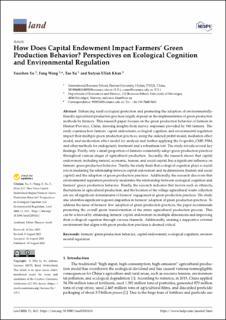| dc.identifier.citation | Xu, X., Wang, F., Xu, T., & Khan, S. U. (2023). How Does Capital Endowment Impact Farmers’ Green Production Behavior? Perspectives on Ecological Cognition and Environmental Regulation. Land, 12(8), 1611. | en_US |
| dc.description.abstract | Enhancing rural ecological protection and promoting the adoption of environmentally-friendly agricultural production practices largely depend on the implementation of green production methods by farmers. This research paper focuses on the green production behavior of farmers in Hainan Province, China, drawing insights from survey responses provided by 543 farmers. The study examines how farmers’ capital endowment, ecological cognition, and environmental regulation impact their multiple green production practices, using the ordered probit model, mediation effect model, and moderation effect model for analysis and further applying the Ivoprobit_CMP, PSM, and other methods for endogeneity treatment and a robustness test. The study reveals several key findings. Firstly, only a small proportion of farmers consistently adopt green production practices throughout various stages of agricultural production. Secondly, the research shows that capital endowment, including natural, economic, human, and social capital, has a significant influence on farmers’ green production behavior. Thirdly, the study finds that ecological cognition plays a crucial role in mediating the relationship between capital endowment and its dimensions (human and social capital) and the adoption of green production practices. Additionally, the research discovers that environmental regulation positively moderates the relationship between ecological cognition and farmers’ green production behavior. Finally, the research indicates that factors such as ethnicity, fluctuations in agricultural production, and the location of the village agricultural waste collection site are all significant determinants of farmers’ engagement in green production practices. The study also identifies significant regional disparities in farmers’ adoption of green production practices. To address the issue of farmers’ low adoption of green production practices, the paper recommends promoting the overall green transformation of the entire agricultural production process. This can be achieved by enhancing farmers’ capital endowment in multiple dimensions and improving their ecological cognition through various channels. Additionally, creating a supportive external environment that aligns with green production practices is deemed critical. | en_US |

